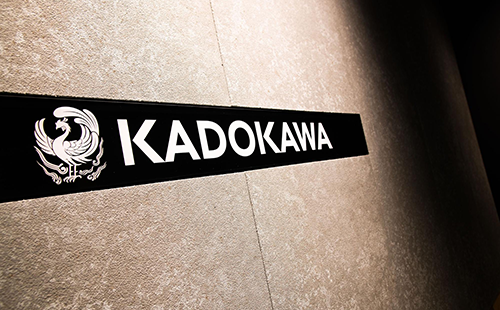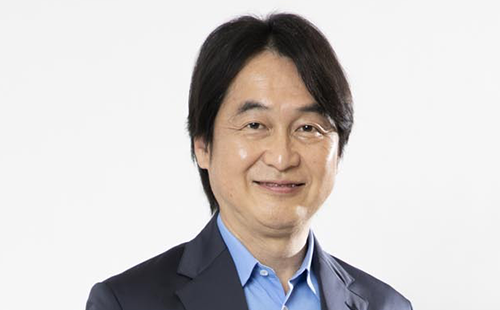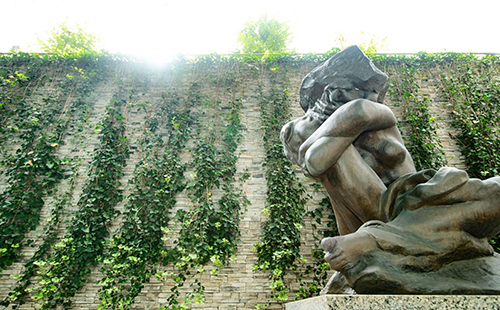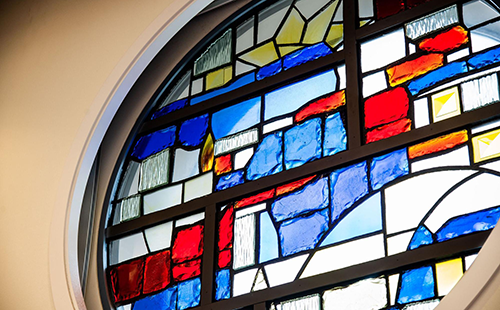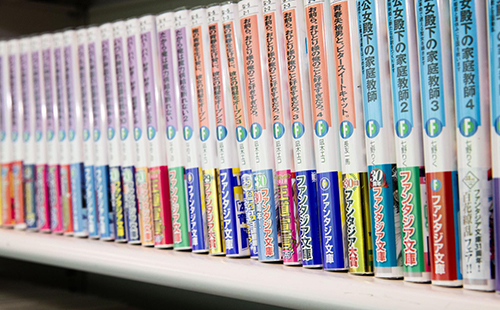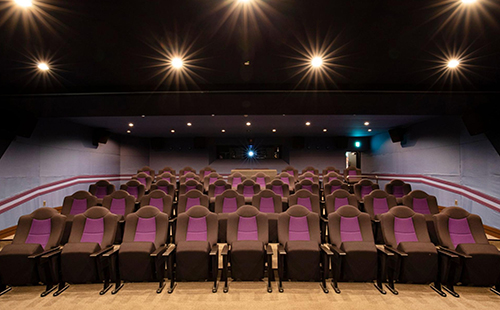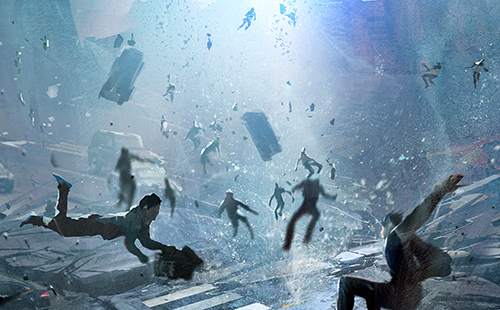CORPORATE HISTORY
Becoming a Comprehensive Media Enterprise:2003–2012
The KADOKAWA Group reformed to a structure consisting of three business lines—publishing, motion pictures, and broadband Internet—to compete in the integrated broadband age. It shifts its management strategy from "selection and concentration" to "selective expansion."
-
2003
KADOKAWA HOLDINGS is founded. KADOKAWA SHOTEN becomes an operating company whose primary business is publishing. The free magazine TOKYO INDEX is launched. Brave Story (2 volumes), by Miyuki Miyabe, and Tsui Tanin ni Tameshitakunaru Yomesoude Yomenai Kanji [Tricky Kanjis You Will Want to Test People On], edited by Gendai Gengo Seminar, become big hits. The magazine Yasei Jidai is published in a new format.
-
2004
KADOKAWA HOLDINGS is listed on the first section of the Tokyo Stock Exchange. KADOKAWA ENTERTAINMENT is established as the video distribution company of motion pictures. ASCII and ENTERBRAIN join the group. KADOKAWA DAIEI PICTURES changes its corporate name to KADOKAWA PICTURES. A business alliance is established with DreamWorks. The magazine Mainichi Ga Hakken is launched.
-
2005
A business alliance is announced with CJ ENTERTAINMENT, a major Korean filmmaker and distributor. NIPPON HERALD FILMS changes its corporate name to KADOKAWA HERALD PICTURES, and becomes a wholly owned subsidiary. FUJIMI SHOBO is established, splitting off from KADOKAWA SHOTEN. The KADOKAWA Group commemorates its 60th anniversary.
-
2006
KADOKAWA HOLDINGS changes its corporate name to KADOKAWA GROUP HOLDINGS. KADOKAWA HERALD PICTURES is established following the merger of KADOKAWA PICTURES and KADOKAWA HERALD PICTURES. KADOKAWA THE TELEVISION and KADOKAWA CROSSMEDIA are established. The paperback edition of The Da Vinci Code is published in three volumes, becoming one of the biggest hits in KADOKAWA's history, with accumulated sales of over 10M copies combined with hardcover sales. The KADOKAWA Group established "the Charter of KADOKAWA" as its basic corporate philosophy on the corporate 60th anniversary.
-
2007
KADOKAWA SHOTEN is split into KADOKAWA SHOTEN, KADOKAWA MAGAZINES, KADOKAWA GROUP PUBLISHING, and several other operational companies. KADOKAWA HERALD PICTURES changes its corporate name to KADOKAWA PICTURES. KADOKAWA INTERCONTINENTAL PUBLISHING is established in Hong Kong. The "Maho no Island" label is launched, and the paper publishing of cell phone novels begins.
-
2008
KADOKAWA MARKETING is launched. ASCII MEDIA WORKS is established through a merger. The Kadokawa Bunko Paperback 60th Anniversary Project is launched. The "Kadokawa Sneaker Paperback" label and the "Fujimi Fantasia Bunko" label commemorate their 20th anniversaries, "Dengeki Bunko" its 15th anniversary, and "Famitsuu Bunko" its 10th anniversary. The movie Rashomon, directed by Akira Kurosawa, is digitally restored in Hollywood.
-
2009
CHUKEI PUBLISHING joins the group. KADOKAWA GAMES, K. SENSE, and KADOKAWA CONTENTS GATE are established. "Kadokawa Tsubasa Paperback" is launched as the first label to cut across all group companies. The movie The Unbroken is released, sweeping the year's movie awards, including best film prize at the Japanese Academy Awards.
-
2010
MAHO NO ISLAND joins the group. GUANGZHOU TIANWEN KADOKAWA ANIMATION & COMICS is established. KADOKAWA GROUP HOLDINGS is selected for the "Corporate Activity Award" by the Tokyo Stock Exchange. Enters into a comprehensive business alliance with DWANGO for digital books and distribution of various content. The e-book store "BOOK☆WALKER" is launched. Tenchi Meisatsu wins the 7th Booksellers Award. Thermae Romae wins the 2010 cartoon grand prize. The magazine Tokyo Walker celebrates its 20th anniversary. The magazine Lettuce Club reaches 700 volumes and Weekly ASCII Magazine reaches 800 volumes.
-
2011
KADOKAWA SHOTEN and KADOKAWA PICTURES, KADOKAWA MARKETING and KADOKAWA SSCOMMUNICATIONS, ASCII MEDIA WORKS and MAHO NO ISLAND, KADOKAWA CONTENTS GATE and WORDS GEAR are merged, respectively. Business alliance is formed with GREE, and capital appliance is formed with DWANGO. Web comic service, "KADOKAWA nicinico A" which is a collaboration of niconico and BOOK☆WALKER was launched. MUBICHIKE, an online movie ticket sales company, is established. The Surprise of Suzumiya Haruhi is released worldwide.
-
2012
KADOKAWA CONTENTS GATE changes its corporate name to BOOK WALKER. KADOKAWA GROUP PUBLISHING and KADOKAWA SHUPPAN HANBAI merge. A joint venture, the DOCOMO ANIME STORE, is founded, starting an animation streaming service for smartphones.
The dramatization of Biblia Koshodo no Jiken Techo and an animated version of Sword Art Online become huge hits.
The 13th volume of the comic franchise Evangelion is released simultaneously in 15 countries and regions worldwide, and also as an e-book. “LOLLIPOP CHAINSAW”, the first original game produced by KADOKAWA GAMES, is released worldwide.
The implementation of EPUB3 is announced, starting the BOOK☆WALKER platform.
KADOKAWA Group companies start providing content to newly launched e-book stores such as Rakuten Kobo and Amazon Kindle as they start providing services to the Japanese market. A huge amount of content starts to be provided to BOOK☆WALKER from other publishing companies. The “Kadokawa Mandarin Light Novel & Illustration Contest” is held for the first time, co-hosted by China and Taiwan.

